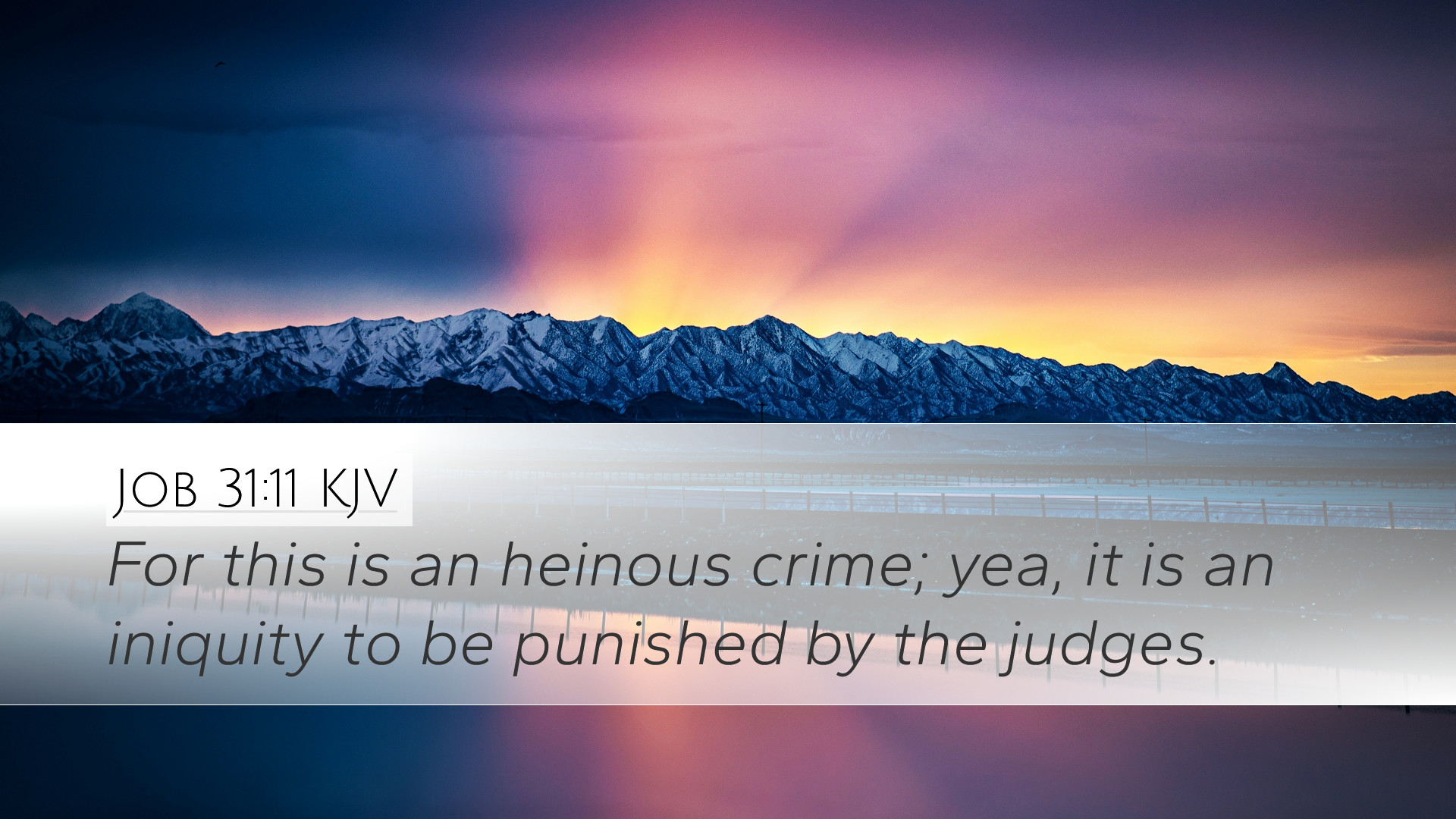Commentary on Job 31:11
Job 31:11: "For what is our lot from God above, our heritage from the Almighty on high?"
This verse is a profound expression from Job in the context of his defense against the accusations of his friends. Here, he articulates the weighty consequence of sin, particularly in relation to sexual immorality. Understanding this verse requires delving into the theological implications of sin, justice, and divine retribution.
Textual Analysis
Job's emphasis on the 'heritage' from God indicates an awareness of divine justice and the moral order established by God. He is reflecting on the blessings and responsibilities that come from God, including the call to live a life of integrity and righteousness.
Contextual Background
The larger context of these verses can be found within Job's monologue where he is presenting his case, arguing against the claims that he has sinned significantly to deserve the sufferings he has encountered. His statements are firm, appealing to the very character of God and the covenantal relationship Job believes he has with Him.
Thematic Insights
- Divine Justice: Job's remarks suggest a deep-seated belief in the justice of God. He believes that God does not punish the righteous without cause.
- Moral Accountability: Job's reflections stress the importance of personal responsibility regarding one's thoughts and actions, particularly in matters of lust and immorality.
- Human Vulnerability: The acknowledgement of the potential for sin underscores the notion that all humanity is vulnerable and must strive toward holiness.
Commentary Insights
Matthew Henry's Commentary
Matthew Henry emphasizes the catastrophic nature of infidelity; he regards it as a betrayal of one's soul and divine intention. He posits that transgressions against moral commands lead not only to personal ruin but also to attracting God’s disfavor. The passage is mirrored against the divine intentions originally embedded in humanity at creation, aligning one's life with God's overarching plan for sanctity.
Albert Barnes' Notes on the Bible
Albert Barnes focuses on the idea that Job is disavowing any illicit relationships or interactions. He points out that the sins of the flesh, especially adultery and sexual vice, come with profound consequences that even transcend the earthly realm into spiritual estrangement from God. Barnes highlights the significant stance Job takes in claiming innocence in these matters while acknowledging God's sovereignty over his fate.
Adam Clarke's Commentary
Adam Clarke offers a broader interpretation, encouraging readers to view Job's lamentation as a reflective discourse on the nature of suffering. Clarke interprets Job’s pledge of fidelity not solely as a personal vow but also as a public declaration of his faith. He ties this integrity to the larger scope of understanding God's ultimate plan for salvation and the role of righteousness amidst trials.
Pastoral and Theological Implications
In pastoral ministry, Job 31:11 serves as a foundational text for discussing moral integrity, personal holiness, and the potential spiritual dangers of a lax approach to sin. For theologians and scholars, this verse raises questions about the nature of divine justice and the social implications of adhering to moral commandments.
Practical Applications:
- Holistic Integrity: The call for integrity extends to all facets of life—spiritual, emotional, and physical. Pastors can encourage congregations to uphold this standard.
- Understanding Consequences: Making the biblical connection between actions and consequences helps believers realize the weight of their choices.
- Encouraging Transparency: Within communities of faith, fostering an open environment can help individuals support one another in their spiritual journeys.
Conclusion
Ultimately, Job 31:11 beckons both individual reflection and communal dialogue on the nature of sin, the consequences of immorality, and the beauty of a life devoted to God. By rooting our lives in the truth of God's word, as demonstrated by Job, believers can find a path toward both personal integrity and collective righteousness. The verse stands as a poignant reminder of the sacred heritage entrusted by the Almighty to his people, challenging them to live lives worthy of that calling.


